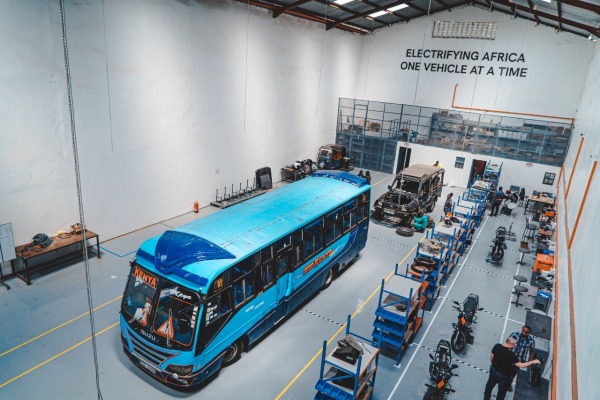Opibus, the first company in Kenya to commercially future-proof diesel and gasoline vehicles by converting them to electric, is set to embark on an ambitious plan to mass produce electric buses and motorcycles after unlocking $7.5 million in pre series A round.
The Swedish-Kenyan company raised $5 million in equity and $2.5 million in grants in a round led by Silicon Valley fund At One Ventures, backed by Factor[e] Ventures and pan-African VC firm Ambo Ventures. The round is the company’s first major fundraise, having previously raised capital from angel investors.
Opibus told TechCrunch that it is looking to deliver its first electric bus by the first quarter of next year.
“We are proud to be backed by globally recognized investors providing a balance between deep-tech and emerging market expertise. We have together reached a clear strategic and visionary alignment, with the conviction that mass manufacturing of electric mobility solutions in Africa will not only make the products more accessible and affordable, but also lead to one of the largest industrialization and welfare transitions of the region in modern time,” said Opibus’ CEO and co-founder, Filip Gardler.
Founded in 2017 by Gardler, Filip Lövström and Mikael Gånge, Opibus has over the years specialized in auto conversions, and is now moving to full electric vehicle manufacturing, starting with motorcycles and public commercial vehicles, all while developing charging and energy solutions.
“The targets and objectives we’ve set for Opibus might seem bold, however it is a mission that has become more important than ever. We have a responsibility to the coming generations and the earth [as a] whole,” said Gardler.
Already, the company has started taking pre-orders of its electric motorcycles, while confirming to TechCrunch that the demand is promising. Opibus bikes will start at $1,300 depending on several features including battery capacity. The company said the competitive advantage of its product includes declining operational costs of up to 60% lower that of fossil fuel alternatives.
Going forward, the company plans to move to a bigger plant as it prepares to increase its production to serve the entire African continent.
“We are about giving vehicles a second life but for motorcycles we see that we won’t be able to scale fast enough if we’re converting motorcycles. And since we want to design a product that’s better than what is already in the market, we are building our bikes from the ground up – by designing and manufacturing them in-house,” Opibus’ chief strategy and marketing officer Albin Wilson told TechCrunch.
In addition to Kenya, the company’s other clients are spread out in Nigeria, Sierra Leone, Ghana, Uganda, Democratic Republic of Congo and South Africa.
A switch to electric power offers countries in sub-Saharan Africa a range of gains including a reduced cost of transport and lower carbon emissions. Countries like South Africa, Mauritius and Rwanda are already ahead of the game. South Africa has drafted a roadmap for the increased production and adoption of fully electric vehicles, while Rwanda rolled-out incentives that will make it less costly to buy and operate them.
“The electric mobility space in Africa represents a huge opportunity; not only to provide a better service at a lower cost to customers, but also to reduce carbon emissions and avoid deadly exposure to particulate pollution on a local level,” said Factor[e] Ventures managing partner, Morgan DeFoort.
Reports show that electric mobility in Africa is nascent but opportunities remain vast, especially if the infrastructure to support its adoption is built. Challenges facing the industry include the initial high cost of electric vehicles, a lack of charging infrastructure, low grid power connectivity, taxation and low level of awareness about EVs.
With inadequate infrastructure being among the biggest setbacks in EV adoption, Opibus has started installing communal charging infrastructure to serve public transport providers. The company plans to install the charging hubs in major towns near the country’s capital city, Nairobi, as it builds out a network that will sustain the mass transport electric buses planned for launch next year. Opibus also plans to forge partnerships with mini grid companies to ensure that its motorcycle customers in rural areas have access to charging points.
The company sees great potential for electric vehicles on the continent as the price of items like the solar batteries reduce significantly. It has so far converted 170 vehicles to serve different clientele including mining companies and tour firms. Its SUV conversions reach a maximum speed of 50 miles per hour, and an off-road driving range of just over 60 mph.
For its conversions, Opibus replaces diesel and gasoline engines with electric motors and controllers, served by battery packs that are fitted with minimal modifications on the chassis.
Credit: Source link





















